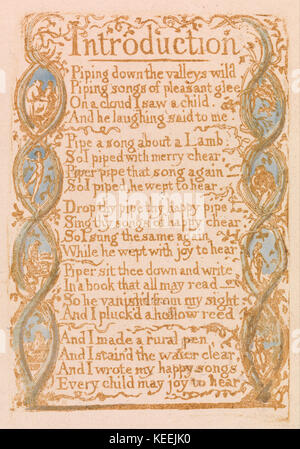

Throughout his life of meticulous and tedious composite art Blake aimed at decoding the Bible as the Great Code of Art for helping people to be imaginative and visionary like Jesus Christ. Norton and Compan, Inc., 2006.Although William Blake was highly eclectic and drawing from multifarious sources, religious system, philosophical thoughts and traditions, the Bible was Blake's most predominant concern. The Norton Anthology of British Literature, 8th ed. The Songs of Experience reflect an older, more mature perception of the world and the progression from childhood and innocence to adulthood and experience. As shown, many of The Songs of Innocence are hopeful, innocent, youthful and free from the corruption of society. Some poems from The Songs of Innocence and The Songs of Experience may have the same titles, but the choices of words the William Blake uses help set contrasting tones.

He thought that these images were essential to the poetry text, and therefore, we found them important to include. He was an artist, as well as a writer, and published most of his works by himself. We have also included many of the illustrations that Blake created to accompany each of the poems. Each poem stands as a separate poem, however, many of the poems in The Songs of Innocence have a counterpart in The Songs of Experience.(1) On this page, we will compare and contrast four sets of contrary poems, and give a brief analysis of each. Although the physical world has not changed, the state of the soul of individuals has, and therefore, the perception of the physical world leads to the difference in the depiction of society. Likewise, in the Songs of Experience, the same world is described as a much more terrifying one of war, poverty, disease, and social oppression. Innocence refers to the inner feelings and the purity of the soul rather than social perfection. Many of them include cruelty and suffering. The Songs of Innocence, however, do not completely describe a faultless world. Blake says that these two sets of poems are meant to capture “two contrary states of the human soul”. In 1794, he added the Songs of Experience. The Song’s of Innocence were written in 1789. Companion Poems From Songs of Innocence and Experience


 0 kommentar(er)
0 kommentar(er)
